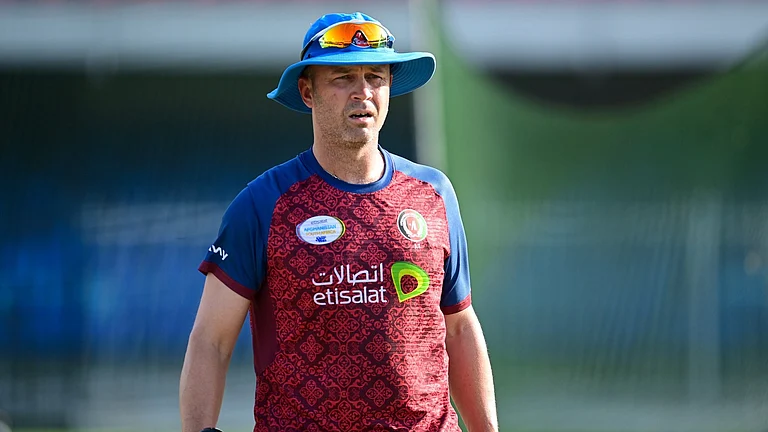Last December, at the peak of North India's bone-chilling winter, a farmer cycled 400 kms from his home in Faridkot, Punjab, to join farmers protesting against the three new farm laws at the Tikri borders on the outskirts of Delhi. All that he carried with him was a poem by Avtar Singh Sandhu, also famous as Paash.
The stirring poem, titled 'Sab Ton Khatarnaak' (The Most Dangerous), has become the leitmotif of the farmers' protests. And like a slow burning flame, it kept the hearts of many protestors, in cold dark nights, lit with hope.
Kirat di lutt, Sab ton khatarnak nahin hundi
Police di kutt, Sab ton khatarnak nahin hundi
Gaddaari-lobh di muth, Sab ton khatarnak nahin hundi
And goes on to state
Sab ton khatarnak hunda hai
Na hona tadap da
Sabh kujh sehan kar jaana
Ghar ton niklana kamm,
te kamm to ghar aana
Sab ton khatarnak hunda hai,
Saade supniaan da mar jaana
The most dangerous is
being filled with deathly silence
to bear everything quietly
to leave home for work
and to return home like routine,
The most dangerous is the death of our dreams.
The farmers' protest isn't unique in this aspect. The first response, or at any rate the first memorable response, of any society recovering from a big setback is usually in the form of poems. Soon after the twin towers fell to the 9/11 terrorist attack, copies of WH Auden's September 1, 1939 began circulating through the streets of New York. 'All I have is a voice/To undo the folded lie' wrote Auden in that poem. Noted Urdu poet Jagan Nath Azad, is said to have remarked upon hearing about the demolition of Babri Masjid -
Ye tune Hind ki hurmat ke aaine ko toda hai
Khabar bhi hai tujhe Masjid ka gumbad todne wale
Humare dil ko toda hai imaarat ko nahi toda
Khabaasat ki bhi had hoti hai had todne wale
What you have broken is the image of reverence of India
Do you have this idea, you who have broken the dome of the mosque
Not the building but our hearts have been broken
Your wickedness is limitless
The response to many people who felt wronged by the three farm laws, the Citizenship Ammendment Bill or by the attacks on the campuses of Jamia Millia Islamia and JNU, was also voiced in verse. Poems by Varun Grover 'Hum Kaaghaz Nahi Dikhayenge' and Amir Aziz' 'Sab Yaad Rakha Jaayega' were voiced from Mumbai's Azad Maidan to Delhi's Shaheen Bagh. Some old poems such as Faiz's 'Hum Dekhenge' and Raahat Indori's 'Kisi Ke Baap Ka Hindustan Thodi Hai' also saw new renditions.
With one year of farmers' agitation having pushed the government to roll back the three farm laws we look at some of these verses which for many were not just protest anthems but powerful statements that ring true many years after they were composed.
Hum Dekhenge - Faiz
Hum Dekhenge
Lazim Hai Ke Hum Bhi Dekhenge,
Hum Dekhenge
We will see
It's inevitable that we'll also see
We will see
Kisi ke baap ka hindustan thodi hai - Raahat Indori
Sabka khuun hai shamil yahan ki mitti mein
Kisi ke baap ka Hindustan thodi hai
Everyone's sweat and blood has nourished this soil
Dare they think India is their own property
Hum Kaaghaz nahi dikhayenge - Varun Grover
Hum kaagaz nahi dikhayenge
Taanashah aake jayenge
Hum kaagaz nahi dikhayenge
We won't show you the paper [proof of our citizenship]
Autocrats will come and go
We won't show you the paper
Tum Kaun Ho Be - Puneet Sharma
Hindustan se mera rishta hai
Tum kaun ho be
Kyun batlaun tumko kitna gehra hai
Tum kaun ho be
There's a connect between India and me
Who the hell are you
Why should I tell how deep it runs
Who the hell are you
Sab Yaad Rakha Jayega - Amir Aziz
Toh Tum Zameen Pe Zulm Likh Do,
Asmaan Pe Inquilab Likha Jayega,
Sab Yaad Rakha Jayega, Sab Kuch Yad Rakha Jayega
You oppress us on land
Revolution will fill the skies
All will be remembered, Everything will be remembered
Bol - Faiz
Bol ki lab azaad hain tere
bol zubaan ab tak teri hai
tera sutvaan jism hai tera
bol ki jaan ab tak teri hai
Speak up, that your lips are free
Speak up, that your voice is your own
Your straight body is yours
Speak up, that your life is your own


























